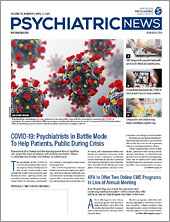Psychiatrists learn very early on in their training about the incredible and irreplaceable power of social support for all of our patients and their families. This social support is even more critical during disasters, catastrophes, and epidemics, and the ripple effect of this support can spread throughout an entire community. While mass impact events like the COVID-19 outbreak can be incredibly tragic, there can be a silver lining in communities coming together as a unified front to help one another in a showing of neighborly love, compassion, empathy, kindness, openness, and selflessness.
As of press time, the Centers for Disease Control and Prevention (CDC) is recommending social distancing to slow the spread of COVID-19. Yet, for psychiatrists, advocating social distancing during a global pandemic may seem akin to fixing a leaky boat with water. By removing social support and activity from our patients, we can expect that some may experience a worsening of their symptoms. Given the current climate, what are we to say to our patients when we have a proverbial hand tied behind our backs?
Here are some very practical tips that we can suggest to our patients and health systems, as well as follow ourselves:
•
Social distancing does not have to mean social isolation. Yes, it may be difficult to take part in larger gatherings that can be incredibly inspiring and unifying, such as church services, concerts, and sporting events. However, this can be a time for connecting with loved ones. So many of us often think to ourselves, “I wish I had more time with my loved ones.” This is a great opportunity to catch up with loved ones and have really meaningful conversations and experiences. It offers a chance to put cellphones and laptops away and break out the old board games and card decks. A very healthy use of electronics would be to video chat with loved ones and stay connected to real-world relationships.
•
Social distancing does not mean self-imprisonment. Exercise and fresh air improve the immune response while boosting emotional and mental wellness. Going for a jog along a nature trail or playing ball with loved ones or pets in an open field are great ways to connect to nature and reduce stress. Even while indoors, keeping the windows cracked can keep fresh air moving, which helps to prevent the spread of viruses while pushing back against cabin fever.
•
Use this as a moment in time to connect to something deeper within yourself. Many of our patients desperately want more time for self-care, reflection, mindfulness, and connectedness. Similar to family time, many people have “wellness bucket lists,” so to speak, or lists of things that they would love to do but just never seem to find the time to do them. This could be a time for quiet reflection, journaling, thinking about where people are in their lives, appreciating the moment through mindfulness, catching a sunrise or a sunset, visiting a new hiking trail, or catching up with an old novel. It could also be a time for creative pursuits, such as dusting off the old guitar or art canvas or finding that creative-writing journal that is buried under medical journals and notes. It might also be a great time to share this creativity with others.
•
Check news once a day from a reliable source. Watching the 24/7 news cycle will serve only to increase anxiety and/or paranoia. A healthy limit is to check updates once a day on reliable, authoritative sites, such as those of the CDC and World Health Organization.
•
Resist the urge to binge-watch Netflix. Spending long hours indoors without fresh air and spending long stretches of time in dark isolation can be deleterious to both emotional and physical health.
Our patients are already at risk for social isolation as a result of psychiatric symptoms, and many of our patients have good reasons to feel anxious, mistrustful, or paranoid based on their life experiences. Pandemics can certainly increase all of these feelings, and people who are medically ill, have loved ones who are ill, or have experienced traumatic grief and loss are especially at risk for increased symptoms. We must ensure that all of our patients are safe and getting high-quality care at a time when there may be a shortage of health care professionals and patients may want to cancel appointments.
As a society, we have to be very careful to not fall prey to xenophobia or discrimination against those whom we deem ill or responsible for this pandemic. It is critically important to reinforce unity, togetherness, resilience, and hope during these times. Humans have withstood the test of many catastrophic events throughout history and have always overcome difficult odds by persevering and supporting one another. We can do the same. ■

